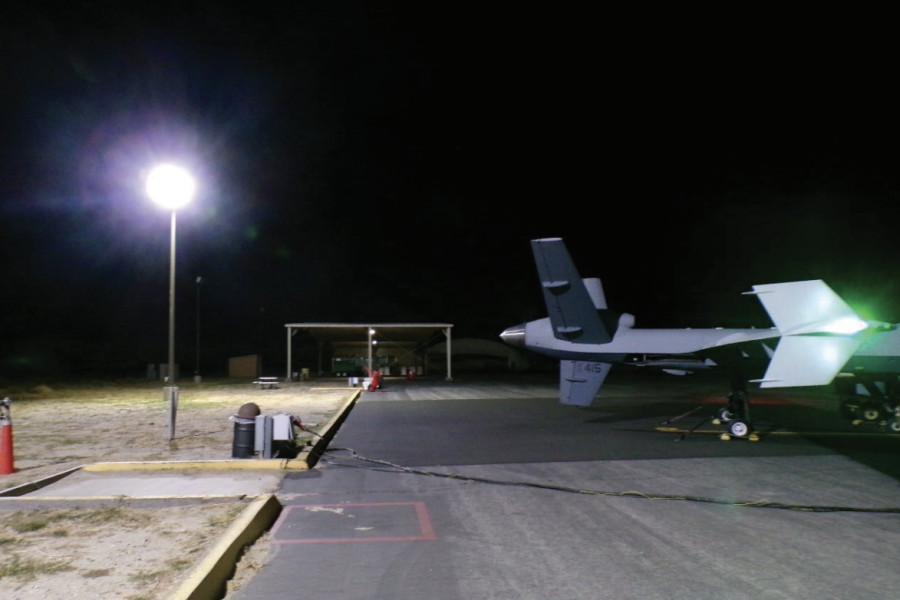The death of a contractor killed last year when she walked into the moving propeller of an MQ-9 during ground tests was blamed on a confluence of factors, including inadequate training, poor lighting, noisy conditions, poor conditions, and a rush to finish testing, all of which contributed to the victim’s loss of situational awareness while she took telemetry readings.
Stephanie Cosme, 32, of Palmdale, Calif., died Sept. 7, 2023. She was a test engineer for Sumaria Systems performing test support functions for Detachment 3 of the Air Force Life Cycle Management Center at Gray Butte Airfield, Calif., according to an Air Force accident investigation report.
Cosme was taking readings seeking to see if new software for the MQ-9 would generate electromagnetic interference that might affect the drone’s critical systems and weapons.
The tests had been scheduled for the day prior, but were scratched before the aircraft was pulled from the hangar. When a member of the team suggested canceling the tests, the test director stated “We’re going to run until we fall.”
That evening, the test director discovered that the spectrum analyzer used in previous tests was “out for calibration,” according to the report. So the team decided to use a smaller, handheld device, which had to be held just a few feet away from the parked aircraft to get a reading.
The test director conducted a “dry run” on Sept. 6, walking around the drone with its engine off, holding the handheld device, while Cosme observed the procedure. But members of the ground crew later said they did not know what her role in testing was or that she would be approaching the aircraft once its engines were started during testing.
The next day, the pre-test mission briefing was supposed to cover 24 points but actually included “well less” than that, skipping over portions that would have identified every team member’s assigned roles and safety warnings about “aircraft keep out zones,” the report stated.
The aircraft was taken out of the hangar and testing continued into the evening. As darkness fell, Investigators said, the test director and the team began to rush through the process. The report notes comments such as, “C’mon guys, the quicker you respond, the faster we get out of here.”
While most of the test engineers and the director were at the ground control station, Cosme was near the aircraft, with only a cell phone for communications.
When the time came for her to record the telemetry data, Cosme walked directly toward the aircraft without checking in with the crew chief, then walked beside the fuselage while looking down at the handheld device. That’s when she walked directly into the drone’s propeller. She never looked up.
Investigators later recreated the lighting and noise conditions of the mishap and determined that “the spinning propeller was not visible when looking to the rear of the aircraft,” and the noise was such that Cosme could not have heard anything but the engine.
Ground crew took measures to control her bleeding within moments of Cosme being struck, and emergency responders were on the scene within six minutes. A medical helicopter crew transported her to a local hospital within an hour, but Cosme could not be resuscitated.
Air Force investigators declared that the main causes of the deadly accident were Cosme receiving improper training and her losing situational awareness during the test. Specifically, investigators found “conflicting guidance concerning the danger areas and propeller no enter zones for the MQ-9A” and could only confirm that Cosme had been instructed on the “least restrictive” standards. On top of that, she was not familiar with or properly trained to use the handheld device the test director switched to, and was not told “the proper procedures to approach a running aircraft,” according to the report.
Cosme had limited background and knowledge of the MQ-9 or the device she was using, and the lighting and noise conditions also likely contributed to her losing awareness, investigators said.
Finally, poor communication and rushing meant the entire test team and ground crew did not follow proper safety procedures, the report concluded.
The accident investigation report is the second released this week regarding a contractor-involved mishap with an MQ-9—in January 2023, a drone crashed in in Victorville, Calif. No one was injured in that incident.
